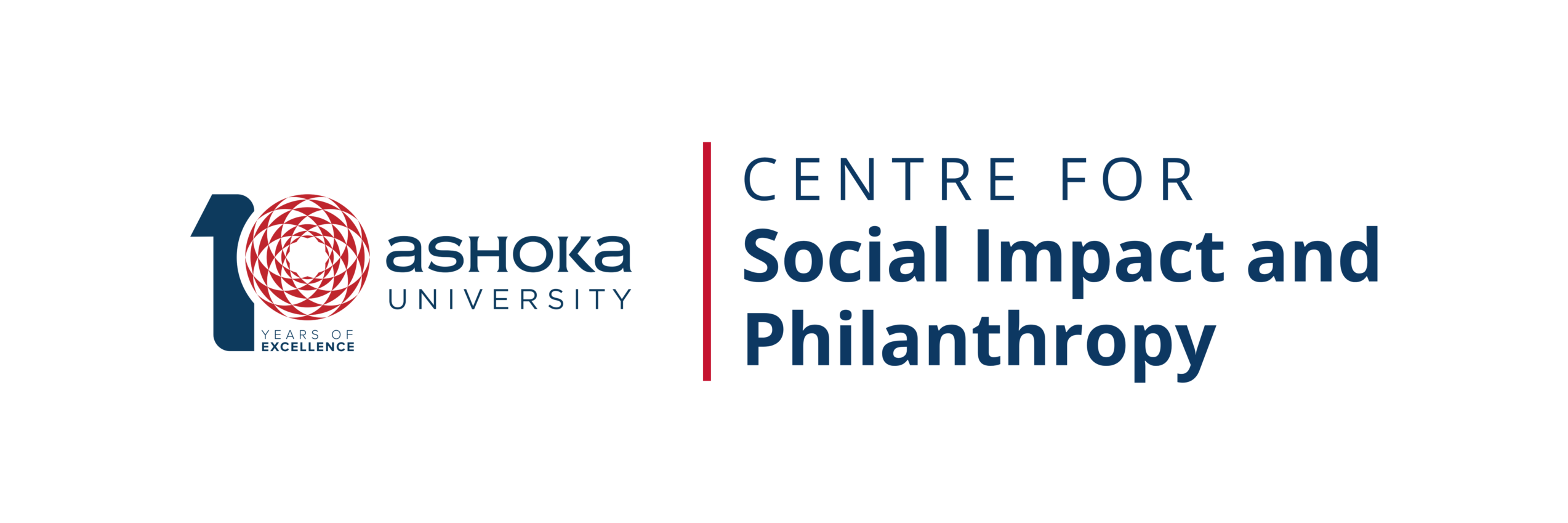Strategic Nonprofit Management—India
Dates: To be announced
Location: Ashoka University
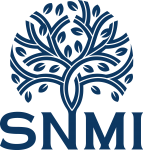


Dates: To be announced
Location: Ashoka University
India’s nonprofit sector has the potential to make significant inroads into the region’s challenges — from ensuring access to clean water, sanitation, and nutritious food to improving health care and education. To succeed, social impact leaders must develop a focused mission and strategy, a solid operational model, strong governance, and effective leadership. SNMI’s professors, sector experts and alumni network prepare you for building high-performance organisations that can fulfill their missions, expand their scopes, and achieve their potential for improving lives. Developed in partnership with the Harvard Business School (HBS) Social Enterprise Initiative, SNMI is offered through the Centre for Social Impact and Philanthropy (CSIP) at Ashoka University in India.
The programme fee of ₹ 2,36,000 (inclusive of GST) covers tuition, books, case materials, accommodation, and most meals. Need-based scholarships may be available to qualified candidates. Please contact Soumya Mohil for details at snmi@ashoka.edu.in.
SNMI can enhance your social impact in myriad ways.
Through a rich learning experience — including faculty presentations, case studies, dynamic classroom discussions, small-group workshops, guest speakers, and panel discussions — you will gain a deeper understanding of how successful nonprofit organisations are addressing their challenges and achieving their mission.
SNMI’s curriculum emphasizes South and Southeast Asia, with roughly two-thirds of the cases based on organisations in this region. Participants will learn alongside peers who share the challenges of operating in an emerging economy characterized by social challenges and infrastructure gaps. In special workshops throughout the program, you will team with peers to work on challenges that each of you has identified as critical to the success of your respective organisations. These exercises will help you formulate a plan of action to address your organisation’s challenges upon returning to work.
SNMI is developed and taught by top faculty who are widely recognized as skilled educators, groundbreaking researchers, and award-winning authors. Through their board memberships, consulting, and field-based research, they address the complex challenges facing nonprofit leaders across the globe.



Prof. V. Kasturi Rangan is Malcolm P. McNair Professor of Marketing at Harvard Business School. View his full bio here.
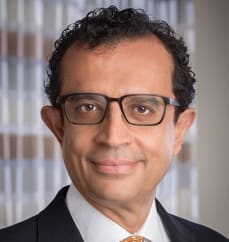


Prof. Vikram Gandhi is Senior Lecturer of Business Administration at Harvard Business School. View his full bio here.
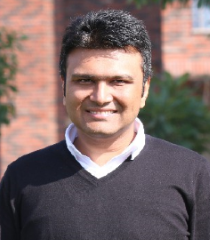


Prof. Priyank Narayan is Head of the Department, Entrepreneurship at Ashoka University. View his full bio here.
More than 200 social impact leaders from Africa, Asia, and Oceania have earned SNMI certification since the launch of this executive education programme in 2017. Our alumni remain connected to their cohorts and the full SNMI community, and engaged with the Centre for Social Impact and Philanthropy, through a range of convening and research opportunities.
If you participated in one of our SNMI cohorts and would like to be added to the WhatsApp group for your cohort and/or all SNMI alumni, please send your name, cohort year and phone number to snmi@ashoka.edu.in.
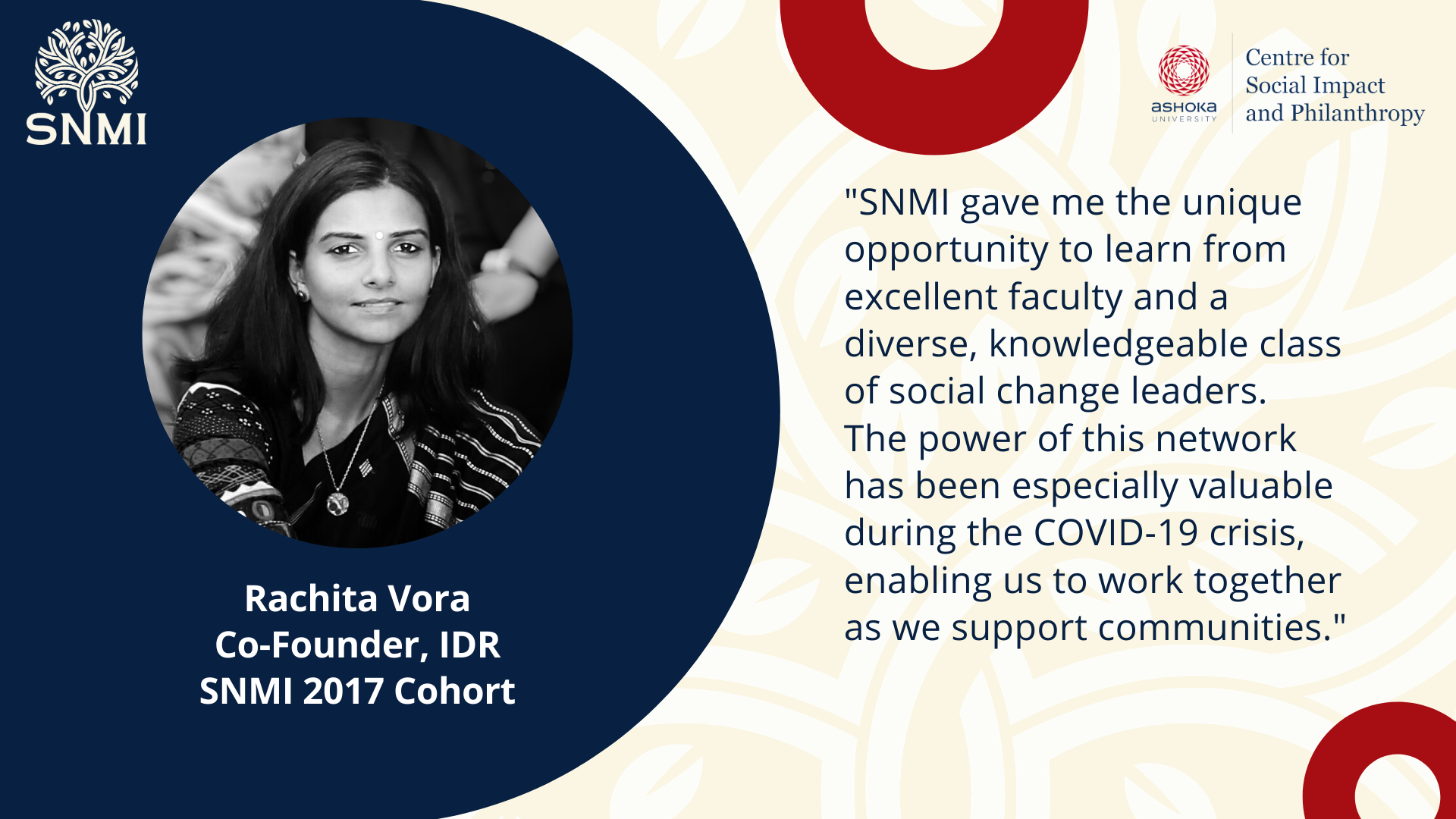
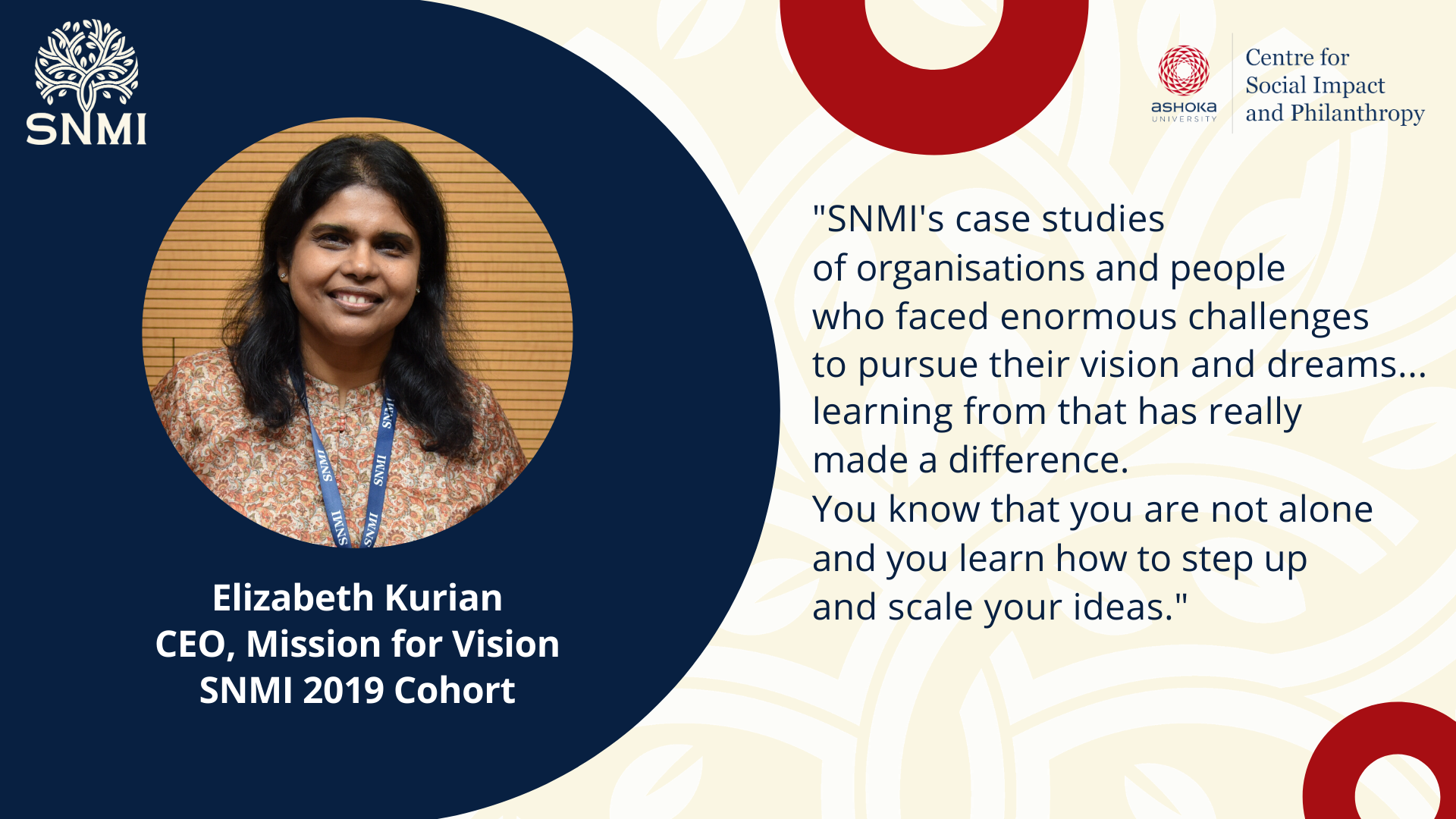
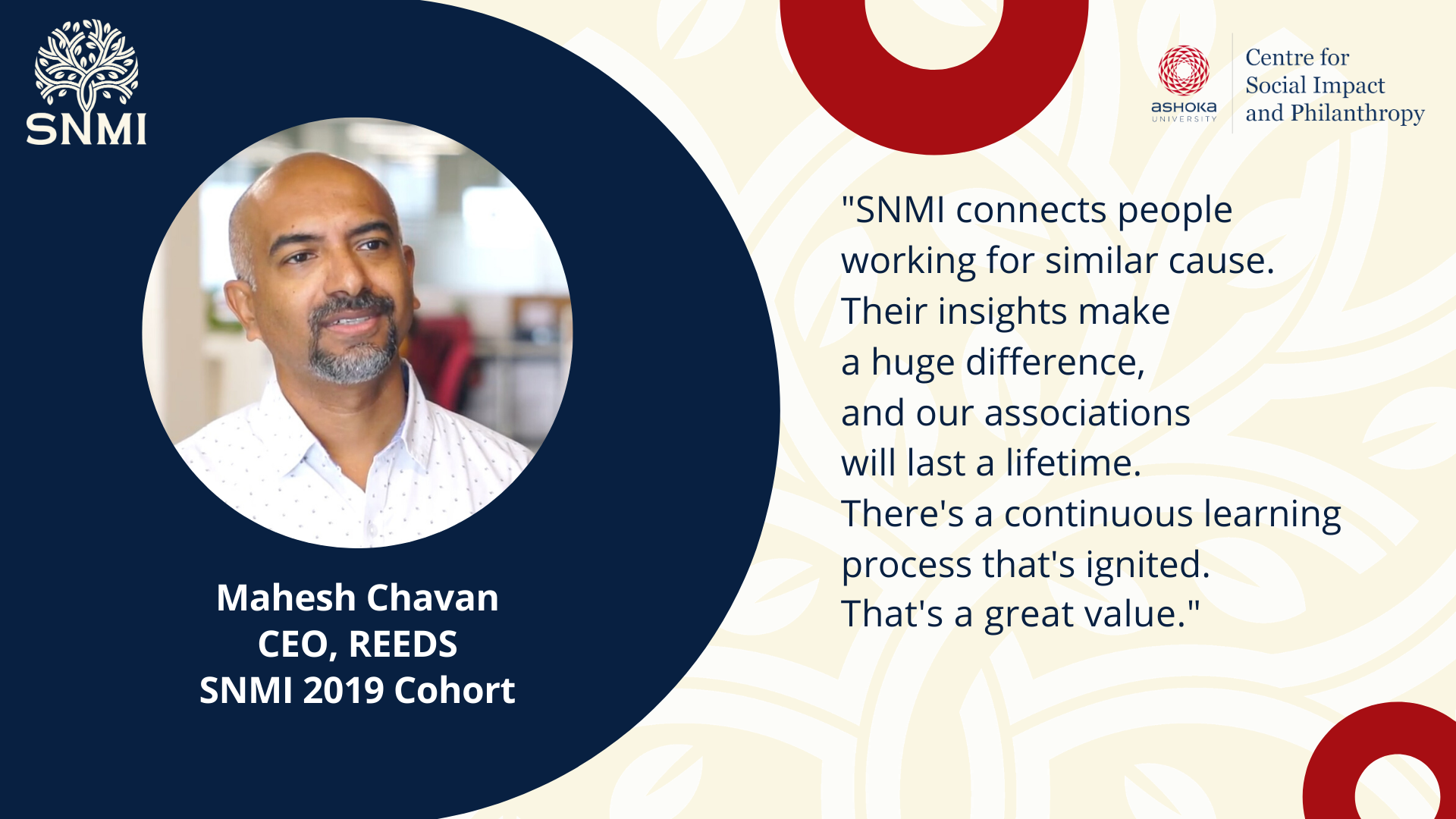
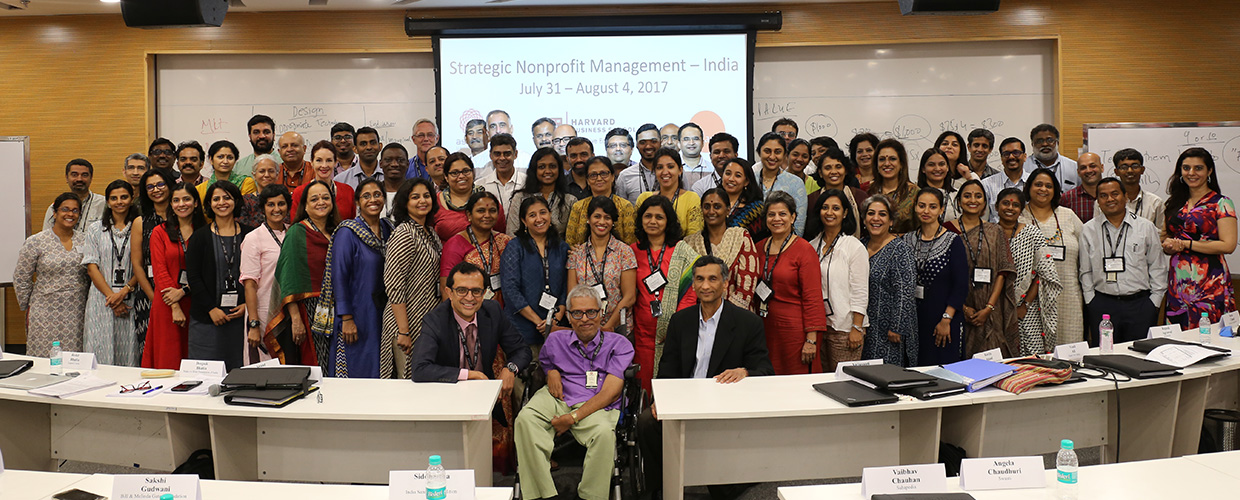
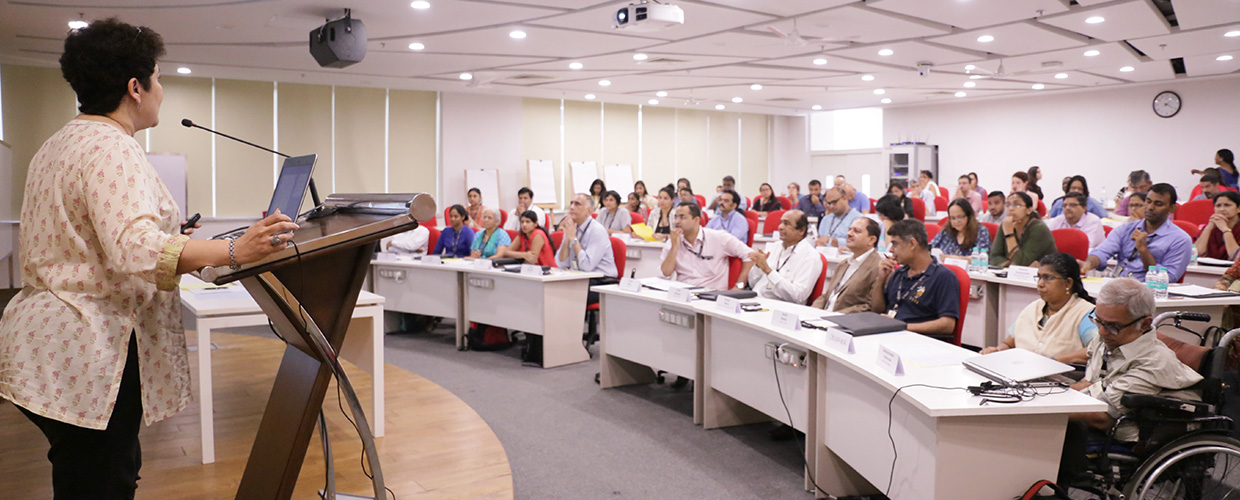
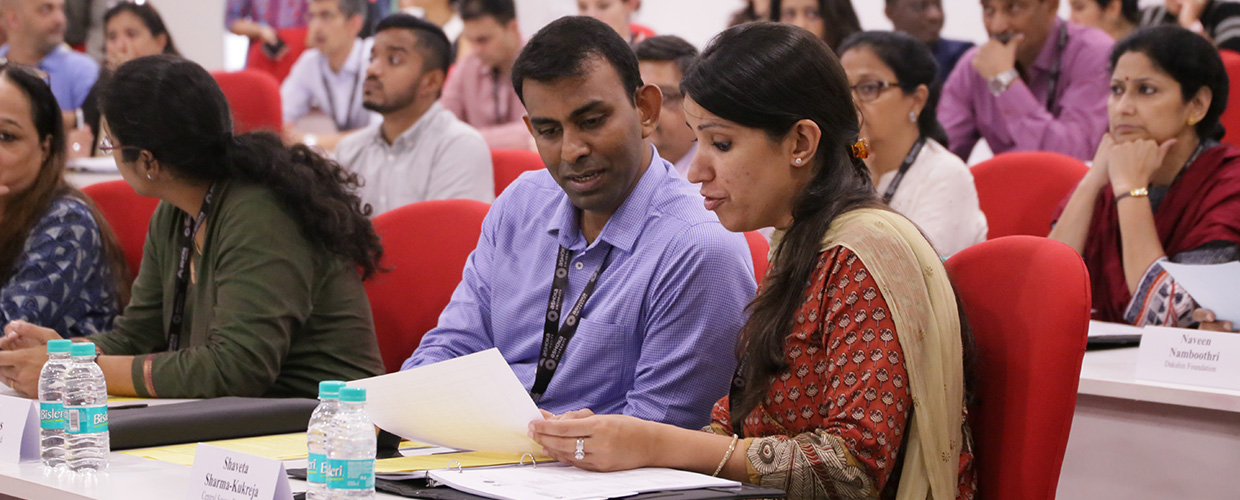
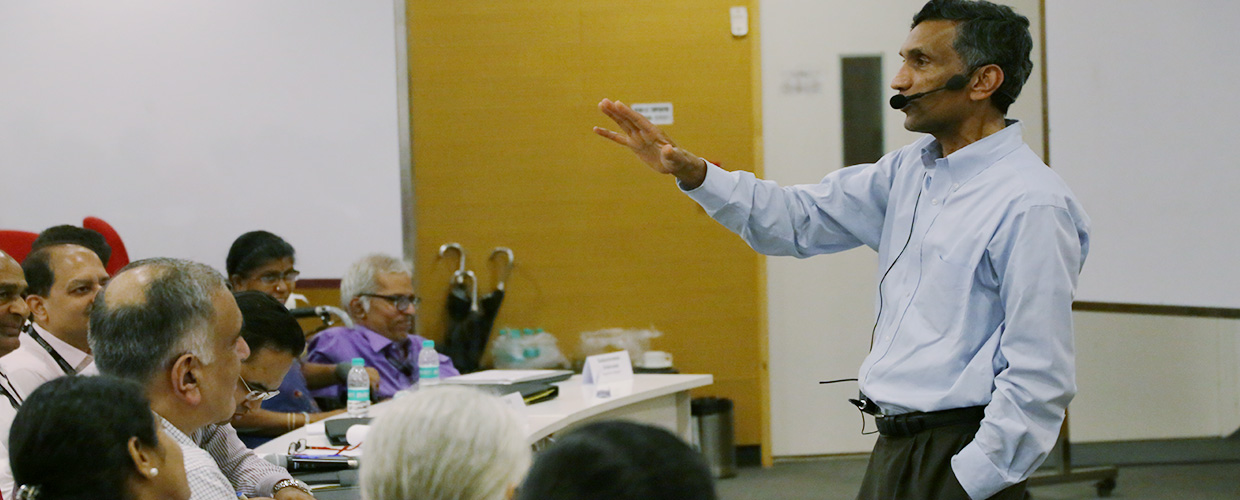
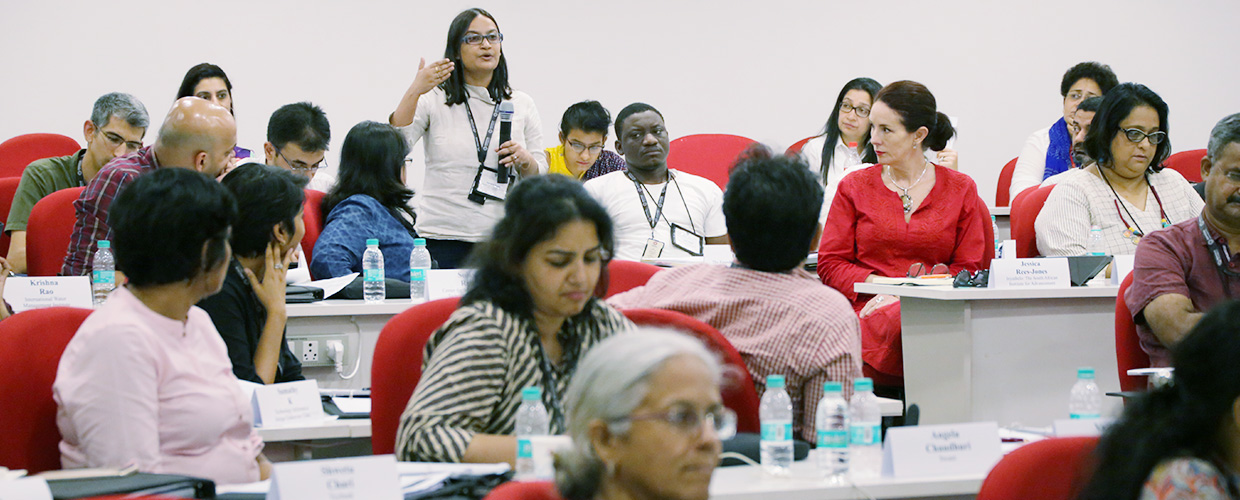
What are the SNMI 2020 application and programme dates?
In response to ongoing COVID-19 travel restrictions and community health concerns, the Centre for Social Impact and Philanthropy (CSIP) at Ashoka University has made the difficult decision to cancel the July 26-31, 2020 session of SNMI this year. In lieu of this certificate programme, Ashoka University and Harvard Business School’s Executive Education will be offering a separate online training for nonprofit leaders this summer, related to building resilience in these challenging times. If you are interested in learning more about this training opportunity or receiving notifications when SNMI announces its 2021 dates and programme description, please email snmi@ashoka.edu.in to join our mailing list.
Where does SNMI take place?
SNMI is held on campus at Ashoka University in Sonepat, 40 km north of Delhi, India. The closest airport is the Indira Gandhi International Airport (DEL).
When will accepted applicants be notified?
Applicants are notified on a rolling basis.
How much does this programme cost?
The programme fee of ₹2,36,000 (inclusive of GST) covers tuition, books, case materials, accommodation, and all meals. However, this does not cover airfare / travel to the Ashoka University campus. Payment will not be requested from accepted applicants until after June 15, 2020.
Is financial aid available?
Need-based scholarships may be available for candidates who have been accepted to the SNMI programme and are otherwise qualified for financial aid. Please contact Soumya Mohil for details at snmi@ashoka.edu.in.
Who is eligible to attend SNMI?
Now in its fourth year, SNMI is open to 80 exceptional and diverse social sector leaders in 2020. Previous cohorts have included leaders from Central Square Foundation, Clinton Health Access Initiative, CORO, Educate Girls, HelpAge India, Make-A-Wish Foundation, Paani Foundation, QUEST Alliance, and Teach for India. This programme is ideally suited for:
Is SNMI open to applicants from outside India?
Yes. We welcome diverse perspectives, including geographic diversity, to enrich the cohort experience for everyone.
What do participants gain from this experience?
SNMI’s faculty presentations, case studies, dynamic classroom discussions, small-group workshops, guest speakers, and panel discussions will give you a deeper understanding of how successful nonprofit organisations are addressing their challenges and achieving their mission. The programme’s 2020 curriculum emphasizes South and Southeast Asia, with roughly two-thirds of the cases based on organisations in the region. In special workshops throughout the program, you will team with peers to work on challenges that each of you has identified as critical to the success of your respective organisations. These exercises will help you formulate a plan of action to address your organisation’s challenges upon returning to work.
Is it mandatory to attend the entire programme?
Yes. From the keynote speeches to the small-group discussions, the SNMI learning experience is a complete package.
Where do participants stay during the programme?
SNMI participants are housed in one of the residence halls conveniently located on the Ashoka University campus. Rooms are fully furnished, air-conditioned and WiFi accessible. Housekeeping services, including laundry, are available; attendants are on call throughout the day for any cleaning-related requests. Campus breakfast, lunch, and dinner are included in your tuition, as well as morning and afternoon refreshments. Each floor in the residence hall also has a fully stocked pantry, drinking water, refrigerator, and a small-kitchenette for basic cooking needs.
I am not sure if I will be able to attend SNMI. Should I still apply?
Yes! If you are accepted and unable to attend this year, your application will be given priority for SNMI acceptance in 2021.
SNMI alumni, faculty and nonprofit sector leaders share their thoughts on the value of this executive leadership programme.
The Centre for Social Impact and Philanthropy (CSIP) at Ashoka University is India’s first academic centre focused on enabling strategic and robust philanthropy for social impact. It strives to provide civil society with evidence-based research and knowledge products to grow scale and impact, convening platforms for norm-setting and collaborative learning, and leadership development programmes that strengthen capability and sustainability.
About Ashoka University
Ashoka University is a private, non-profit university. An unprecedented example of collective public philanthropy in India, it is a pioneer in its focus on the Liberal Arts. The University offers undergraduate and postgraduate programs across the humanities, social sciences and fundamental natural sciences. The aim is to help students become well-rounded individuals who are able to think critically about issues from multiple perspectives, communicate effectively and go on to become ethical self-aware leaders with a commitment to public service. Ashoka has built collaborations with University of Pennsylvania, University of Michigan, Carleton College, King’s College London, Sciences Po, UC Berkeley, Trinity College Dublin and Yale University. To learn more about Ashoka University visit http://ashoka.edu.in
About the Centre for Social Impact and Philanthropy (CSIP)
The University’s focus is on attracting the brightest students, putting them under the guidance of the most inspirational faculty, and developing a global reputation for innovative research. Faculty and students come from across the country, and the world, and Ashoka is committed to maintaining the highest intellectual and academic standards.
Along with having a robust academic program, the University is home to Centers of Excellence that address some critical areas of relevance to society, and India in particular. This includes the Centre for Social Impact and Philanthropy (CSIP), which aims at being the foremost Centre in India for research and capacity-building towards the critical advancement of social impact. The Centre’s research will be focused on critical topics in the space of social impact, in strategic philanthropy in particular, with emphasis on applied research.
About the role
Centre for Social Impact and Philanthropy is looking for a motivated Academic Director with the vision to enable CSIP to deliver strong academic programmes for both students at the university and the Centre’s key external stakeholders.
The ideal candidate will have an exceptional ability to grasp the complexity of social issues, a strong focus on philanthropy and social development, and unpack their various dimensions. S/he should be able to draw upon the multi-disciplinary themes and topics to lend richness to the capacity building and teaching agenda of the Centre.The candidate should have the flexibility to manage multiple projects simultaneously, the ability to work in a fast moving and dynamic environment, an aptitude for content creation and curriculum design, and be excited to join a young and dynamic team. The role will be split between conceptualising and leading courses for Ashoka University students and building academic programs for the external stakeholders of the Centre. Experience in building and leading teams and interacting with external partners including multiple academic institutions would be valued.
The Academic Director should have an advanced degree in social sciences with 10-15 years of experience, preferably both in academic as well as applied contexts. The candidate should have experience working with course and content creation for a range of potential audiences.
The candidate should have excellent written communication skills required for high quality academic papers and other publications and be a confident oral communicator.
Key Responsibilities
The Academic Director will
Education and Experience
Competitive, based on experience.
To Apply
Please visit our the posting on our Career Site and apply by clicking on “I’m Interested” and filling out the relevant details. Only shortlisted candidates will be contacted.
The Centre for Social Impact and Philanthropy (CSIP) at Ashoka University is India’s first academic centre focused on enabling strategic and robust philanthropy for social impact. It strives to provide civil society with evidence-based research and knowledge products to grow scale and impact, convening platforms for norm-setting and collaborative learning, and leadership development programmes that strengthen capability and sustainability.
About Ashoka University
Ashoka University is a private, non-profit university. An unprecedented example of collective public philanthropy in India, it is a pioneer in its focus on the Liberal Arts. The University offers undergraduate and postgraduate programs across the humanities, social sciences and fundamental natural sciences. The aim is to help students become well-rounded individuals who are able to think critically about issues from multiple perspectives, communicate effectively and go on to become ethical self-aware leaders with a commitment to public service. Ashoka has built collaborations with University of Pennsylvania, University of Michigan, Carleton College, King’s College London, Sciences Po, UC Berkeley, Trinity College Dublin and Yale University. To learn more about Ashoka University visit http://ashoka.edu.in
About the Centre for Social Impact and Philanthropy (CSIP)
The University’s focus is on attracting the brightest students, putting them under the guidance of the most inspirational faculty, and developing a global reputation for innovative research. Faculty and students come from across the country, and the world, and Ashoka is committed to maintaining the highest intellectual and academic standards.
Along with having a robust academic program, the University is home to Centers of Excellence that address some critical areas of relevance to society, and India in particular. This includes the Centre for Social Impact and Philanthropy (CSIP), which aims at being the foremost Centre in India for research and capacity-building towards the critical advancement of social impact. The Centre’s research will be focused on critical topics in the space of social impact, in strategic philanthropy in particular, with emphasis on applied research.
About the role
The Research Team at CSIP is looking for a motivated Senior Research Associate with quantitative research skills to help us expand our research on philanthropy and giving in India. The candidate should have the flexibility to work on multiple projects, the ability to work in a fast-moving and dynamic environment, display a natural aptitude for primary and secondary research, and be excited to join a young and dynamic team.
The Senior Research Associate should have a Master’s degree in a social science subject that includes quantitative methods and 3+ years of relevant work experience. The candidate should have experience working with large datasets, be comfortable undertaking large-scale primary surveys, and be able to creatively consider novel sources of data in philanthropy and giving — an area of research with limited availability of data.
The candidate should have excellent written communication skills required for high-quality research reports, academic papers and other publications.
Key Responsibilities
Competitive, based on experience.
To Apply
Please visit our the posting on our Career Site and apply by clicking on “I’m Interested” and filling out the relevant details. Only shortlisted candidates will be contacted.
The Centre for Social Impact and Philanthropy (CSIP) at Ashoka University is India’s first academic centre focused on enabling strategic and robust philanthropy for social impact. It strives to provide civil society with evidence-based research and knowledge products to grow scale and impact, convening platforms for norm-setting and collaborative learning, and leadership development programmes that strengthen capability and sustainability.
About Ashoka University
Ashoka University is a private, non-profit university. An unprecedented example of collective public philanthropy in India, it is a pioneer in its focus on the Liberal Arts. The University offers undergraduate and postgraduate programs across the humanities, social sciences and fundamental natural sciences. The aim is to help students become well-rounded individuals who are able to think critically about issues from multiple perspectives, communicate effectively and go on to become ethical self-aware leaders with a commitment to public service. Ashoka has built collaborations with University of Pennsylvania, University of Michigan, Carleton College, King’s College London, Sciences Po, UC Berkeley, Trinity College Dublin and Yale University. To learn more about Ashoka University visit http://ashoka.edu.in
About the Centre for Social Impact and Philanthropy (CSIP)
The University’s focus is on attracting the brightest students, putting them under the guidance of the most inspirational faculty, and developing a global reputation for innovative research. Faculty and students come from across the country, and the world, and Ashoka is committed to maintaining the highest intellectual and academic standards.
Along with having a robust academic program, the University is home to Centers of Excellence that address some critical areas of relevance to society, and India in particular. This includes the Centre for Social Impact and Philanthropy (CSIP), which aims at being the foremost Centre in India for research and capacity-building towards the critical advancement of social impact. The Centre’s research will be focused on critical topics in the space of social impact, in strategic philanthropy in particular, with emphasis on applied research.
About the role
Centre of Social Impact and Philanthropy is looking for a Program Manager in Capacity Building specifically for their student and alumni engagement programmes including the Mother Teresa Fellowship (MTF) Programme. The person will also have the responsibility to conceptualise and manage alumni programmes for non-profit and philanthropic leaders like Strategic Nonprofit Management in India, Jumpstart Philanthropy etc.
The candidate should have the flexibility to work on multiple projects, display a natural aptitude for new programs, work with multiple stakeholders, have a deadline-driven approach and be a team player. The candidate should be able to work in a fast moving and dynamic environment.
The Program manager should at least have a master’s degree with work experience on people development or have been a part of leadership programs. The candidate should have 5-7 years of experience working with minimum 2-3 years of field experience. Knowledge and experience of organising events, workshops and seminars is desirable. Any community building experience is a plus. The candidate should have strong verbal communication skills and display a high level of creativity
Key Responsibilities
Does this sound like you?
Compensation: Competitive, based on experience.
Location: Based in NCR, or elsewhere with travel to Sonepat 1-2 days a week. Regular travel to partner locations and workshops.
To Apply: Please click here to access the CSIP career portal and click on “I’m interested” to start your application process. Only shortlisted candidates will be contacted.
About us
The Centre for Social Impact and Philanthropy (CSIP) at Ashoka University is India’s first academic centre focused on enabling strategic and robust philanthropy for social impact. It strives to provide civil society with evidence-based research and knowledge products to grow scale and impact, convening platforms for norm-setting and collaborative learning, and leadership development programmes that strengthen capability and sustainability.
About Ashoka University
Ashoka University is a private, non-profit university. An unprecedented example of collective public philanthropy in India, it is a pioneer in its focus on the Liberal Arts. The University offers undergraduate and postgraduate programs across the humanities, social sciences and fundamental natural sciences. The aim is to help students become well-rounded individuals who are able to think critically about issues from multiple perspectives, communicate effectively and go on to become ethical self-aware leaders with a commitment to public service. Ashoka has built collaborations with University of Pennsylvania, University of Michigan, Carleton College, King’s College London, Sciences Po, UC Berkeley, Trinity College Dublin and Yale University. To learn more about Ashoka University visit http://ashoka.edu.in
About the Centre for Social Impact and Philanthropy (CSIP)
The University’s focus is on attracting the brightest students, putting them under the guidance of the most inspirational faculty, and developing a global reputation for innovative research. Faculty and students come from across the country, and the world, and Ashoka is committed to maintaining the highest intellectual and academic standards.
Along with having a robust academic program, the University is home to Centers of Excellence that address some critical areas of relevance to society, and India in particular. This includes the Centre for Social Impact and Philanthropy (CSIP), which aims at being the foremost Centre in India for research and capacity-building towards the critical advancement of social impact. The Centre’s research will be focused on critical topics in the space of social impact, in strategic philanthropy in particular, with emphasis on applied research.
About the role
Centre of Social Impact and Philanthropy is looking for a Programme Manager in Strategy and Partnerships for handling central functions. The candidate should have the flexibility to work on multiple projects, display a natural aptitude for new programs, work with multiple stakeholders, have a deadline-driven approach and be a team player. The candidate should be able to work in a fast moving and dynamic environment.
The Program manager should at least have a master’s degree with work experience on strategic organisation development and have been a part of roles requiring multi-stakeholder management. The candidate should have 5-6 years of experience working with minimum 2-3 years of field experience. Knowledge and experience of organising events, workshops and seminars is desirable. The candidate should have strong verbal communication skills and display a high level of creativity
Key Responsibilities
Requirements
Benefits and Compensation: Competitive, based on experience.
Location: Based in NCR, or elsewhere with travel to Sonepat 1-2 days a week. Regular travel to partner locations and workshops.
To Apply: Click here to visit the career portal. Click on “I’m interested” button on the page to apply.
Job description for Assistant Manager – Convening at CSIP, Ashoka University
About Ashoka University: Ashoka University is a private, nonprofit university. An unprecedented example of collective public philanthropy in India, it is a pioneer in its focus on the Liberal Arts. The University offers undergraduate and postgraduate programmes across the humanities, social sciences and fundamental natural sciences. The aim is to help students become well rounded individuals who are able to think critically about issues from multiple perspectives, communicate effectively and go on to become ethical self-aware leaders with a commitment to public service. Ashoka has built collaborations with University of Pennsylvania, University of Michigan, Carleton College, King’s College London, Sciences Po, UC Berkeley, Trinity College Dublin and Yale University among others. To learn more about Ashoka University visit http://ashoka.edu.in
About the Centre for Social Impact and Philanthropy (CSIP): Along with its robust academic programme, the University is home to Centres of Excellence that address critical areas of relevance to society, and India in particular. These include the Centre for Social Impact and Philanthropy (CSIP), which is the pioneering Centre in India for research and capacity-building towards the advancement of social impact. The Centre’s research is focused on critical topics in social impact and philanthropy, with emphasis on applied research.
About the Role: Centre for Social Impact and Philanthropy is looking for an Assistant Manager – Convening, to build and strengthen networks among its key constituents and to ensure the widest dissemination of its research and knowledge products. The candidate should have the flexibility to work on multiple projects, display a natural aptitude for partnering with different organisations, planning events and a demonstrated expertise in external communications.
Responsibilities: The candidate will be responsible for the following:
Eligibility and Skill Requirements:
Compensation: Competitive, based on experience.
Location: Based in, or with travel to, Sonipat 3-4 days a week, currently work from home.
Deadline: Rolling basis. This is an urgent hire, early applications preferred.
To Apply: Click here and upload the following documents:
Only shortlisted candidates will be contacted.
CSIP and NFI (National Foundation for India) are collaborating to convene a diverse set of non-profit organisations across India to seek convergence among them, amplify the views and concerns of India’s voluntary sector in policy discourse, create a space for intra and cross sector dialogue and collaboration, and exemplify the norms of governance the collective espouses.
About the Role:
CSIP and NFI is looking for a Convening Consultant to assist in advancing the convening of a collective of Indian non-profit organisations through convenings, focused group discussions, webinars, etc. S/he will work closely with CSIP’s and NFI’s internal teams and partner organisations to help build the collective and will be responsible for supporting outreach initiatives to include a wide range of non-profit organisations as active participants. The ideal candidate will have a good understanding of the Indian voluntary sector and the ability to facilitate convenings – online and offline.
Key Responsibilities
Does this sound like you?
To apply: Please click here to upload your resume and state why you are interested in this role.
Deadline: We will be interviewing on a rolling basis until we find a suitable candidate. Early applications will be preferred.
Compensation: Competitive, based on experience.
Location: The office of CSIP is based out of Ashoka University Campus in Sonipat. But as of now, the position is expected to work on a remote basis. The role might require frequent travel to partner and workshop locations.
About the Role: Centre for Social Impact and Philanthropy is looking for an Assistant Manager – Communications, to strengthen content and design across its website, social media and publications, thereby playing a vital role in brand building and knowledge management. The candidate should have flexibility to work on multiple projects with various team members. The candidate should also have the ability to assess effectiveness of communications through data and analytics.
Responsibilities: The candidate will be responsible for the following:
Eligibility and Skill Requirements
To Apply: Please click here and upload the following documents
Compensation: Competitive, based on experience.
Location: Based in, or with travel to, Sonipat 1-2 days a week. Currently work from home.
Deadline: Rolling basis. This is an urgent hire, early applications preferred.
Note: Only shortlisted candidates will be contacted.
